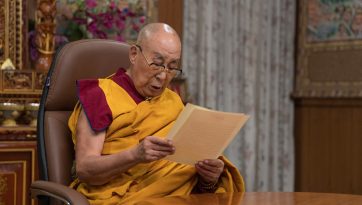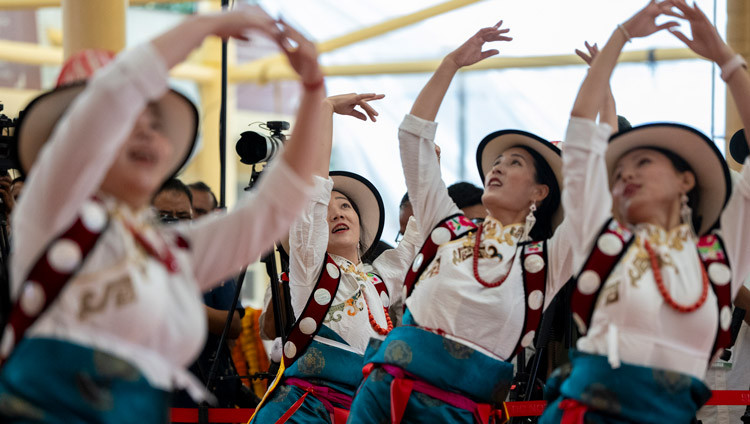Commentary on the Awakening Mind – Third Day
November 7, 2020
Thekchen Chöling, Dharamsala, HP, India – When His Holiness the Dalai Lama arrived before the video cameras this morning he smiled and seeing the faces of old friends on the screens in front of him waved to them in greeting. Telo Rinpoché thanked His Holiness once again for the teaching he was giving. He explained that, today, recitation of the ‘Heart Sutra’ would be in the Kalmyk language from the ‘Golden Abode of Buddha Shakyamuni’ the Central Buddhist Monastery, built at the initiative of former President of Kalmykia, Mr. Kirsan Ilyumzhinov. He added that the monastery plays a vital role in supporting the dharma, culture and language. It also provides aid to the poor and needy and runs social programs related to health and education.
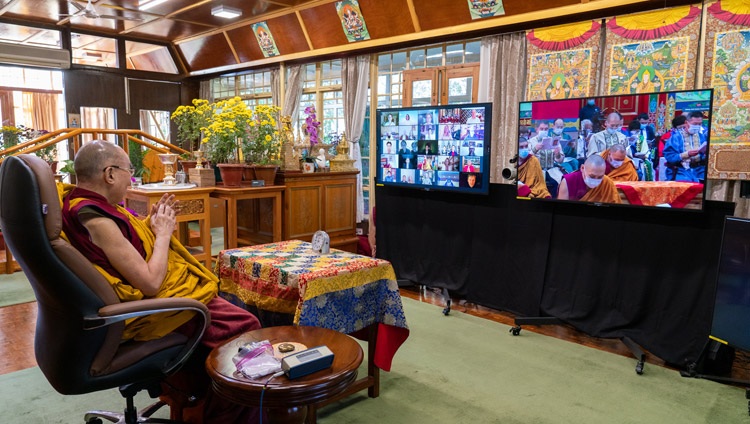
His Holiness followed the Kalmyk recitation of the ‘Heart Sutra’ with evident pleasure.
“Today is a special day,” he began. “The Buddha’s mother, who passed away after he was born, took birth in a celestial realm. He went to visit her reincarnation and spent some time there. Today commemorates his return to the human world from the Heaven of Thirty-three. As I suggested yesterday let’s make an offering to the Buddha by meditating on emptiness and bodhichitta.
“The main purpose of the Buddha’s teaching was to transform his followers’ minds. The ‘Heart Sutra’ you have just recited deals primarily with emptiness. At the beginning it states that the Buddha was absorbed in meditation on profound illumination, which refers to emptiness and bodhichitta. A conversation takes place between Shariputra and Avalokiteshvara.
“During the first turning of the wheel of dharma, the first round of the Buddha’s teachings he spoke about the four noble truths and the selflessness of persons. However, in the ‘Heart Sutra’, which is part of the second round of teachings, it is stated that the five aggregates, the body-mind combination, should also be seen as empty. Avalokiteshvara declares, ‘Form is empty, emptiness is form.’
“Form, beings and other different objects do not exist as they appear. They all exist in dependence on other conditions. Being dependent or independent are diametrically opposed. Because they are devoid of independent existence, things exist by way of designation.
“The conversation took place between Shariputra and Avalokiteshvara due to the inspiration of the Buddha. When it was complete, the Buddha emerged from his meditation and confirmed what Avalokiteshvara had said, for it accorded with his practice over three countless aeons.
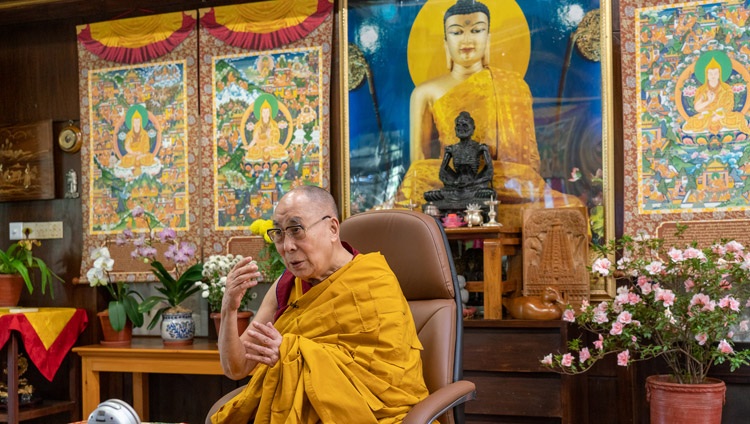
“The perfection of wisdom teachings include the profound and extensive paths. Just saying ‘I take refuge in the Buddha’ doesn’t mean very much on its own. You need to follow what the Buddha taught and apply it so you are transformed and become like the Buddha.
“Nagarjuna makes the situation clear:
“That which is dependent origination
Is explained to be emptiness.
That, being a dependent designation,
Is itself the middle way.
There does not exist anything
That is not dependently arisen.
Therefore, there does not exist anything
That is not empty.
“All destructive emotions can be eliminated by overcoming ignorance. Since ignorance is a misconception of reality, it is defeated by coming to a clear understanding of reality.
“Saying that things lack any true or intrinsic existence doesn’t mean that they don’t exist at all. They exist by way of dependence. They are not objectively existent from their own side.
“Nagarjuna wrote in his ‘Fundamental Wisdom of the Middle Way’:
Through the elimination of karma and mental afflictions there is liberation.
Karma and mental afflictions come from conceptual thoughts.
These come from mental fabrication.
Fabrication ceases through emptiness.
“He made clear that we spin in the cycle of existence because of negative karma, negative action, and liberation can only be attained by eliminating karma and mental afflictions.
“Jé Tsongkhapa commented in his ‘Praise for Dependent Arising’:
In all my births, even at the cost of my life,
may I never falter nor shrink from working
for the wonderful doctrine of the mighty Buddha,
who showed clearly the nature of dependent arising. 56.
I pray that I pass my days and nights
in thinking how I might spread this Dharma,
born from the heroic perseverance
in the face of countless hardships
of this supreme guide.” 57.
His Holiness conceded that the Particularists (Vaibhashikas) and the Sutra Followers (Sautrantikas) assert that things have some sort of objective existence. Moreover, the Mind Only School (Chittamatrin) asserts that a person can be identified with what they call the foundational consciousness. He disclosed that, in this context, he regularly repeats and reflects on the following verses from Chandrakirti’s ‘Entering into the Middle Way’:
If the intrinsic characteristics of things were to arise dependently,
things would come to be destroyed by denying it;
emptiness would then be a cause for the destruction of things.
But this is illogical, so no real entities exist. 6.34
Thus, when such phenomena are analysed,
nothing is found as their nature apart from suchness.
So, the conventional truth of the everyday world
should not be subjected to thorough analysis. 6.35
In the context of suchness, certain reasoning disallows arising
from self or from something other, and that same reasoning
disallows them on the conventional level too.
So, by what means then is your arising established? 6.36
While denying any intrinsic existence of things, we can still assert their everyday existence.
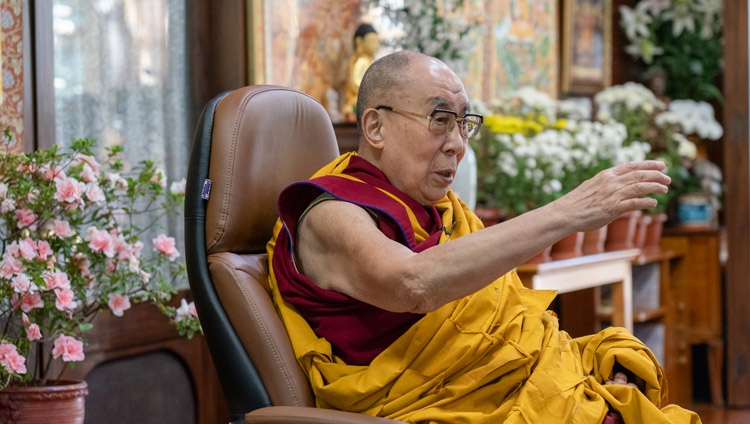
His Holiness invited his audience to meditate briefly on emptiness and suggested that they use his reworked verse from Nagarjuna’s ‘Fundamental Wisdom’:
Not the aggregates, nor separate from them,
[I am] not based on them, nor they on [me];
[I] do not possess the aggregates.
Who, then, am I?
Turning his attention to the cultivation of the awakening mind of bodhichitta, His Holiness quoted verses from Shantideva’s ‘Guide to the Bodhisattva’s Way of Life’:
All those who suffer in the world do so because of their desire for their own happiness. All those happy in the world are so because of their desire for the happiness of others. 8/129
Why say more? Observe this distinction: between the fools who long for their own advantage and the sage who acts for the advantage of others. 8/130
Proceeding in this way from happiness to happiness, what thinking person would despair, after mounting the carriage, the Awakening Mind, which carries away all weariness and effort? 7/30
We spin through cyclic existence because of our stubbornly self-cherishing attitude. However, at the beginning of ‘Entering into the Middle Way’ Chandrakirti states that compassion is the cause of perfect Buddhahood. Through the understanding of emptiness, we are able to see that the liberation of all sentient beings is possible. When we cultivate the wish to become liberated for other sentient beings bodhichitta arises. So, for the sake of others, we aspire to become a fully enlightened being. His Holiness invited the audience to meditate on bodhichitta.
When that was done, His Holiness cited aspirational verses from Shantideva’s ‘Guide’ and Nagarjuna’s ‘Precious Garland’.
As long as space endures and
as long as living beings remain,
until then may I too abide
to dispel the misery of the world. 10/55
May I always be an object of enjoyment
For all sentient beings according to their wish
and without interference,
as are the earth, water, fire, wind, herbs, and wild forests. 5/483
May sentient beings be as dear to me as my own life,
And may they be dearer to me than myself.
May their ill deeds bear fruit for me,
And all my virtues bear fruit for them. 5/484
His Holiness declared that daily meditation on emptiness and bodhichitta is most beneficial. Then, he invited questions from the audience.
The first was from a man who is reassessing his business involved with meat production in the light of cause and effect, but also his need to support his family. His Holiness recognised that traditionally many Mongolians and Tibetans had little option but to eat meat because there were few vegetables available.
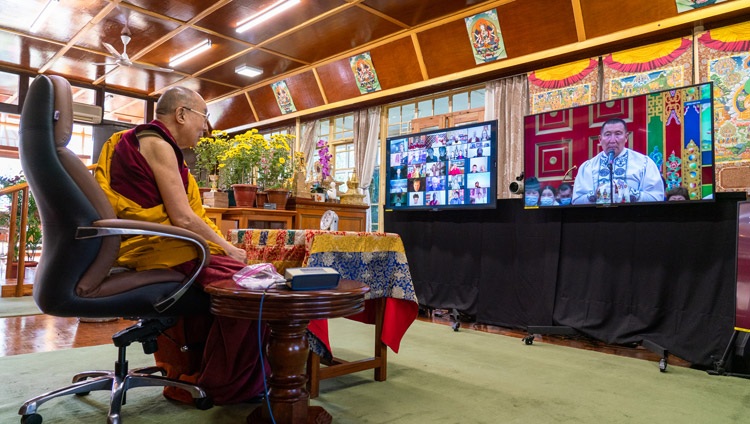
He mentioned that the Buddha had advised his monks of three circumstances under which they could accept meat: when they had not seen with their own eyes that the animal was killed for them; when they had not heard from someone they trust that it was killed specifically for them; and when they had no doubt that it was not killed specially for them. These days the common kitchens of the Tibetan monasteries in South India serve only vegetarian food.
His Holiness noted that industrial farming is said to be bad for the natural environment and results in harm and suffering for animals. His advice was that it would be good to avoid making a living from the slaughter of animals, but acknowledged that that might be difficult, just as it is difficult for nomads to change. When it comes to such decisions, it’s necessary to take your circumstances into account.
A qualm was raised about whether receiving teachings in a virtual situation is as powerful as receiving them from a teacher in person. His Holiness replied that it is good if you can receive a direct oral transmission from a teacher, but that it is more important to study and reflect on the meaning of what you’ve learned. He mentioned the four reliances: reliance on the teaching, not just the teacher, reliance on the meaning, not just the words, reliance on the definitive meaning and not just the interpretable meaning, and reliance on wisdom rather than ordinary consciousness. He recommended reading or listening to the teaching, trying to understand it and integrate it within yourself.
His Holiness told a group, whose Lama, Namkhai Norbu Rinpoché has passed away, that even in his absence they can still be practical about trying to put into practice what he taught. He pointed out that none of us have met Nagarjuna and yet we have his teachings and retain our faith in them.
He recommended that in Russia, where there have been Buddhists for centuries, Buddhism is not something new. These days, he said, by adopting a logical, reasoned approach to the teaching, it should be possible to combine an understanding of the workings of the mind and emotions with the findings of modern science. Since part of Russia is in Asia and part is in Europe it can act as a bridge between East and West. He voiced his encouragement of Buddhists today to be 21st century Buddhists basing their practice on reason and understanding not on faith alone.
A questioner at the Golden Abode of Buddha Shakyamuni in Kalmykia wanted to know why Nagarjuna advocated developing ultimate bodhichitta first and conventional bodhichitta second. His Holiness told her that although Nagarjuna lived almost 2000 years ago, when he reads his writings he feels as if he is standing right beside him. He explained that if you take a reasoned approach, you need to question whether it’s actually possible to eliminate the defilements of the mind and whether it is possible to attain Buddhahood.
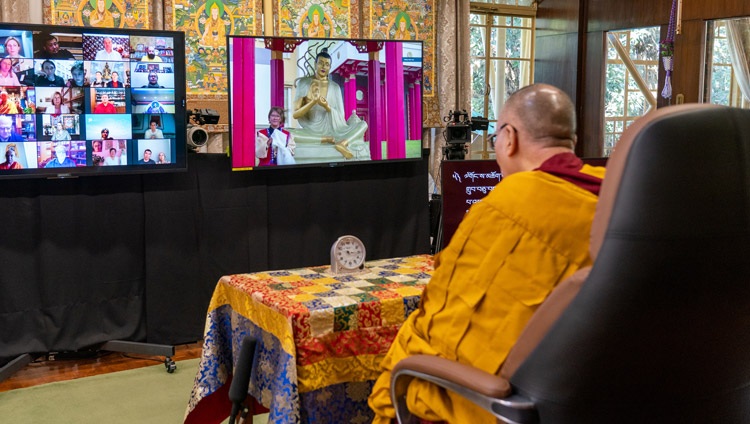
Bodhisattvas focus on enlightenment with wisdom and on sentient beings with compassion. Therefore, it’s crucial to develop the wisdom understanding emptiness. When those with sharp faculties appreciate that it is possible to attain enlightenment, that it is feasible to achieve omniscience, they then consider leading other beings to that state.
One person asked what needed to be done to make it possible for His Holiness to visit Russia, while another enquired what they needed to do to be his disciple in future lives. Answering the first, His Holiness said he appreciated the invitation. He noted that he’s growing older and the pandemic has presently limited his activities. However, when it’s considered that Kalmykia is only a four-hour flight away and Moscow is only three hours beyond that, his visit may not be impossible.
He told the second questioner, “Your future depends on your present. Cultivate a practice of bodhichitta and the wisdom understanding emptiness, which are my essential practices too. Recall them at the time of death and the prayer Jé Tsongkhapa makes at the end of his ‘Foundation of All Good Qualities may be fulfilled.
“May I in all births enjoy the glorious doctrine
Inseparable from the perfect lama;
Having completed the stages and paths,
May I quickly obtain the high state of Vajradhara.
“I’ve received many tantric empowerments, but cultivating the awakening mind of bodhichitta and an understanding of emptiness are my primary practices. If we are to meet again, these are what you can do too.”
Finally, a couple of householders preoccupied with bringing up a family wanted to know what single practice they could do. His Holiness replied that you don’t need to be a monastic to practise bodhichitta and emptiness. He added that if you are involved in education or social work, you may contribute more to society than monks who remain in isolation. He quoted the verse from the end of the sixth chapter of Chandrakirti’s ‘Entering into the Middle Way’:
And like a king of swans soaring ahead of other accomplished swans,
with white wings of conventional and ultimate truths spread wide,
propelled by the powerful winds of virtue, the bodhisattva would cruise
to the excellent far shore, the oceanic qualities of the conquerors. 6.226
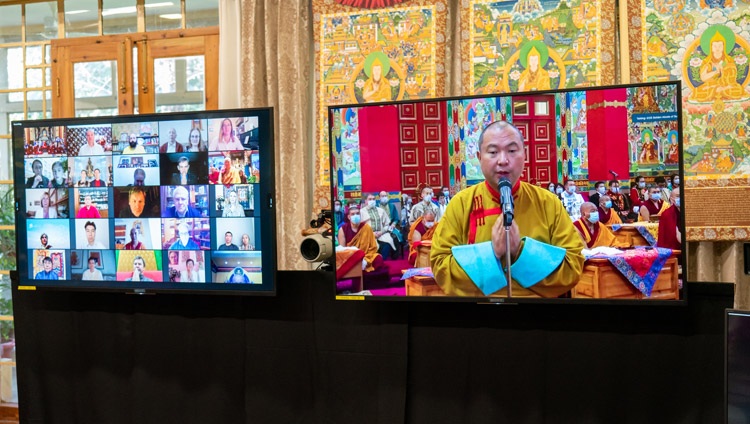
Telo Rinpoché brought the session to a close by thanking His Holiness on behalf of all Russian Buddhists, who had worked together to organize this virtual meeting, for the care he has shown them over the years. He requested His Holiness to be with them and to teach them again in the future. He ended by wishing him good health and a long life.
SOURCE: https://www.dalailama.com/news/2020/commentary-on-the-awakening-mind-third-day

